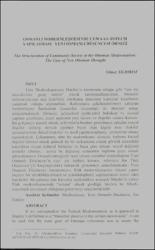| dc.contributor.author | Yıldırım, Yılmaz | |
| dc.date | 2015-04-09 | |
| dc.date.accessioned | 2015-04-09T10:37:09Z | |
| dc.date.available | 2015-04-09T10:37:09Z | |
| dc.date.issued | 2008 | |
| dc.identifier.issn | 1302-1265 | |
| dc.identifier.uri | https://hdl.handle.net/11630/3738 | |
| dc.description.abstract | Türk Modernleşmesini Mardin’in tanımında olduğu gibi “tam bir
ulus-devlete geçiş süreci” olarak kavramsallaştırırsak, Osmanlı
reformcularının ana hedefinin uluslaşma sürecinin kurumsal koşullarını
yaratmak olduğu söylenebilir. Reformlarla şekillendirilmeye çalışılan
modernleşme hareketleri (kurumlar oluşturma) iki düzeyde sonuç
amaçlamaktaydı. Birincisi, geleneksel (pederşahi) hukuksal ve siyasal
yapının çözülmesi, ikinci aşamada yeni kurum ve ilişkiler setinin ikamesi.
Bu gelişmeye paralel olarak, reformlarla beraber getirilmeye çalışılan sosyal
ilişkiler anlayışı mevcut egemen biçim olan kişiler arası ilişkiler
(cemaat)yerine ikincil ilişkileri ve tüzel yapıları(toplum), yerleştirme amacı
taşımaktaydı. Çalışmamız, tüm bir modernleşme sürecini, toplumu kişisel
ilişkiler kümesi olarak görmek ile bir mekanizma olarak görmek arasındaki
karşıtlıkta oluşan kültürel bölünme ve buna göre oluşan sosyal değişimi
anlaşılır kılmayı, ayrıca bu değişimi, cemaatten topluma geçiş olarak
adlandırmanın, Osmanlı örneğinde nasıl istisnai sorunlar oluşturduğunu Yeni
Osmanlı Düşüncesi’ni (yer yer toplum kurucu, reformcu Jön Türk
Düşüncesi’yle karşılaştırarak) tartışarak göstermeyi amaçlamaktadır. Yeni
Osmanlı Düşüncesi, kanaatimizce Türk modernleşmesini istisnai yapan
böylesi bir süreklilik(cemaat) ve yenilik(toplum) yapılaşmasını temsil eden
harekettir. Bu çalışma tüm Batı-dışı modernlikler arasında Mardin’in yalnız
Türk modernleşmesinde “istisna” olarak gördüğü böylesi bir felsefisosyolojik
kavrayışın olduğunu göstermeyi amaçlamaktadır. | en_US |
| dc.description.abstract | If we conceptualize the Turkish Modernization, as it appeared in
Mardin’s definition as a “transition process to the certain nation-state”, it can
be said that the main goal of Ottoman reformists was to create the institutional conditions of the nationalization process. The modernization
movements that is attempted to concern with reforms (in the means of
building institutions) was intending consequences which is twofold. First the
dissolution of traditional (patriarchal) juridical and political structure, and
secondly, the replacement of new set of institutions and relations. Parallel to
this development, the conceivement of social relationships which is tried to
construct through the reforms was aiming to replace the current dominant
forms of inter-personnel relations (community) with the secondary relations
and judicial structures (society). This study, aims to reveal the whole
modernization process, by making understandable the cultural split that
occurs in the opposition between considering society as personal relations
and as a mechanism, and the social transformation which occurs
accordingly, and furthermore, by showing that how it creates exceptional
problems, to name this transformation as a transition from community to
society, in the example of Ottoman, through the discussion of the New
Ottoman Thought – through comparing with partly social constructor,
reformist Young Turk’s Thought. In our opinion, the New Ottoman Thought
is the movement that represents the structuration of such a continuation
(community) and innovation (society), in which the Turkish Modernization
becomes exceptional. This study also aims to reval that, there is such a
philosophic-sociologic conceivement which is seen by Mardin, among all
non-western modernities only in Turkish Modernity, as “exception”. | en_US |
| dc.language.iso | tr | |
| dc.publisher | Afyon Kocatepe Üniversitesi | en_US |
| dc.relation.ispartof | Sosyal Bilimler Dergisi | |
| dc.rights | info:eu-repo/semantics/openAccess | en_US |
| dc.subject | Modernleşme | en_US |
| dc.subject | Yeni Osmanlı Düşüncesi | en_US |
| dc.subject | Jön Türkler | en_US |
| dc.title | Osmanlı Modernleşmesinde Cemaat-Toplum Yapılaşması: Yeni Osmanlı Düşüncesi Örneği | en_US |
| dc.title.alternative | The Structuration of Community-Society in the Ottoman Modernisation: The Case of New Ottoman Thought | en_US |
| dc.type | Article | |
| dc.department | Afyonkarahisar Kocatepe Üniversitesi, Sosyoloji Bölümü | en_US |
| dc.identifier.volume | 10 | en_US |
| dc.identifier.startpage | 1 | en_US |
| dc.identifier.endpage | 21 | en_US |
| dc.identifier.issue | 3 | en_US |
| dc.relation.publicationcategory | Makale - Uluslararası Hakemli Dergi - Kurum Yayını | en_US |



















